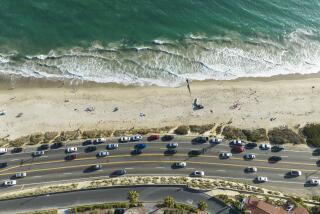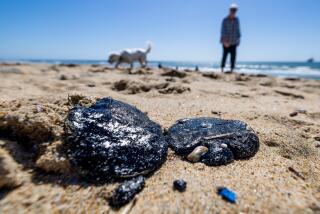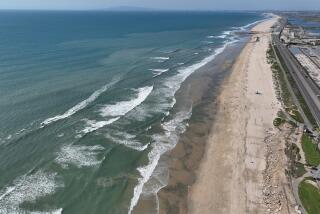Remaining Oil Blown Onto Beaches : Cleanup: Workers battle high winds when operations are consolidated on shore.
- Share via
Howling winds from the north tossed more than 60,000 gallons of Alaskan crude onto Orange County beaches this morning, bringing virtually all the remaining oil from last week’s spill onto land and creating an enormous cleanup job for 1,300 wind-swept workers.
The slick, caused when the tanker American Trader ran over its own anchor while trying to moor off the coast of Huntington Beach last Wednesday, has moved up and down the coastline all week, coming ashore in waves and then retreating.
Last night and this morning, however, the delicate balance of wind and tides that had held the slick in abeyance broke down completely.
“Everything has hit the shoreline,” Coast Guard Petty Officer Dennis Hall said this morning. “All the oil that was in the water is now on the beach.”
For the first time since the American Trader dumped 394,000 gallons of crude into the ocean a week ago, the Coast Guard this morning found no oil floating in the water.
A few splotches of thin oil sheen remained off the coast, local officials said later, but all agreed that virtually all of the spill has landed. Between the Santa Ana River and the Newport Harbor entrance, where last night’s onslaught was heaviest, globs of oil as thick and heavy as lava stood in ribbons six inches thick.
Cleanup operations, which had been divided between ocean skimming and onshore swabbing, were consolidated. “Most of the oil that’s left was pushed ashore last night,” Coast Guard Capt. James C. Card said at a morning press conference. “It’s now pretty much a beach cleanup operation.”
The oil broke into two distinct slicks yesterday afternoon and began sweeping onto the beach but it skirted wetland areas that had been of concern all week.
Pat Moore, a spokesman for the state Department of Fish and Game, said that 157 birds have died as a result of the spill and that 314 are being cared for at a treatment center on Terminal Island.
Despite the mounting bird totals, booms protecting the wetlands held firm, staving off what could have been a devastating blow to several species of waterfowl. “This could have been a whole lot worse,” Moore said.
Coast Guard officials said they estimate that about 36% of the spilled oil was skimmed off the water’s surface before it landed on the beach and that 46% either evaporated or naturally dispersed in ocean currents, they added.
That left at least 63,000 gallons to wash ashore last night and today, and cleaning it up could take weeks.
This morning’s cleanup was hampered by the winds, which forced suspension of the beach operations at 10:45 p.m. and allowed oil to build up on the shore. Although cleanup resumed at 6 a.m. today, crews continued to battle high winds.
Some workers donned goggles and protective masks to shield themselves from the winds, which gusted to more than 30 m.p.h.
At Huntington Beach, workers huddled behind a makeshift windbreak built from the absorbent pads used to swab the beach. The morning’s main challenge was staying warm, said Dave Mickey, a field engineer helping to oversee beach cleanup.
“Yesterday . . . it was heat prostration,” he added. “Never a dull moment.”
More to Read
Sign up for Essential California
The most important California stories and recommendations in your inbox every morning.
You may occasionally receive promotional content from the Los Angeles Times.











